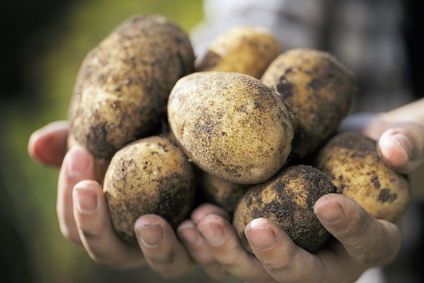The Totty Man is Here!
Some of the strangest objects, smells or sounds can evoke memories. For example, potatoes always make me think of Sharp, the Totty Man.
 The memory is circa 1950 when I was a child living in the Vale of Leven near Balloch and the sight of Sharp's lorry, piled high with loose potatoes, caused street games to stop. A spirit of enterprise replaced games of chase and we kids became ruthless entrepreneurs.
The memory is circa 1950 when I was a child living in the Vale of Leven near Balloch and the sight of Sharp's lorry, piled high with loose potatoes, caused street games to stop. A spirit of enterprise replaced games of chase and we kids became ruthless entrepreneurs.
Cash could be made by collecting orders from the older, less able or just plain lazy tenement-bound housewives who flinched at the thought of descending several flights to buy potatoes, even although they were much cheaper than potatoes from the local fruit and veg shop.
Before Mr. Sharp could blow his whistle to announce his arrival, many of us would already have scrambled to the topmost landings. Door knockers were hammered and small, businesslike fists thumped on door panels as we yelled, "Missus, the totty man's here! D'ye want any?"
Weighing the potatoes was a delicate matter carried out with dexterity and precision. Like the scales of justice, Mr. Sharp's scales were shaped like a giant T' with a bowl on one side and a flat plate on the
other. He scooped the potatoes into the metal bowl then plonked brass weights, resembling giant checkers
and chess pieces, on the flat plate opposite until bowl and plate hung, perfectly balanced. Satisfied with the exactitude of this operation, he would smile and wink as he tipped the potatoes off the scales into the customer's bag then throw in a couple extra.
Getting the heavy bags of potatoes up two or three flights of stairs was a struggle but our customers were always grateful and slipped us a few pennies from their change. And if Mr. Sharp had done well we would get a few bob from him too. Then we would ride on the back of his lorry, some cheeky ones leaving it only when the entrepreneurs in the next street threatened to 'batter' them. Today, heaving my polythene bag of washed potatoes into a supermarket shopping trolley isn't half as exciting as hitching a lift on Sharp's lorry.
Another great character was the fishmonger who used to visit our street regularly.
"Loch Fyne herring!" he would shout. "Fresh herring!"
A giant of a man, his hands and clothing smeared with fish scales, he pushed a wooden barrow stacked with fish. The sound of metal-rimmed wheels trundling over cobblestones provided a rumbling accompaniment to his shouts. Teatime after his visits were glorious affairs. Families relished the taste of herring done in oatmeal accompanied, if luck or coincidence prevailed, by a mound of Mr. Sharp's new potatoes.
Another visitor who pushed a barrow was a very old man, his skin as brown and crinkled as a walnut shell, who sharpened knives and mended pots and pans. His wheelbarrow was his workshop and held a fascinating array of tools. He sharpened knives on a Carborundum wheel built into the barrow which he turned by operating a wooden treadle. We watched as his leathery hands pressed the edge of the blade to the turning stone. Sparks flew and we screamed with delight. In minutes, blackened old knives emerged keen edged and sparkling.
My most vivid memory, however, is of the rag-and-bone merchant who created the stir and atmosphere of a fair when he arrived in the street. He announced his arrival with blasts on a battered bugle. His lorry, piled high with old clothing and bric-a-brac, was invariably festooned with bunting and balloons. Noisy and colourful, he could teach today's advertisers a thing or two. The ads shown on contemporary Saturday morning children's television are small beer in comparison to the psychology which he employed to involve small children in the persuasive harassment of their mothers.
For every pound in weight of old clothes or for every piece of household junk which our mothers would part with, we were given a small gift. There were round balloons and sausage shaped balloons, whirling plastic windmills on a stick, plastic bird whistles which produced a warbling sound when filled with water and clay pipes for making soapy bubbles. And there was the magic of it all. In those post war days when money was meted out only for necessities, children coveted such rubbish. Any inclination to ignore the blast of the tinker's trumpet was difficult when the kids were crying for toys.
Editor's Note: Some others may recall the "rag man" offering crockery in exchange for rags. Woollens were particularly coveted. Cups, saucers and plates were given in return for these. His cry, which accompanied the bugle was, "Any old rags! Delft for rags!"
(Delft was originally pottery from the town of Delft in Holland but the rag men used it as a generic term for the very basic and plain white crockery they dispensed in return for the rags.)


